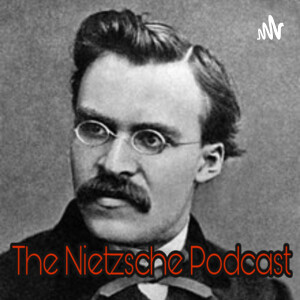
46: The World as Will to Power… And Nothing Besides! (Democritus & Boscovich)
 2022-07-12
2022-07-12
Download
Right click and do "save link as"
On our second excursion into Nietzschean science, we’re studying Nietzsche’s two most celebrated figures in science: one from Ancient Greece and another from Enlightenment Europe. In Democritus, Nietzsche sees the zenith of the materialist project in Greek philosophy, opening the way for a mathematical atomist description of the world, carried on by the Pythagoreans. In Boscovich, he finds a continuation of this project, centuries later - to describe the world by one force or law, and account for the problem of motion in a way that rejects Kantian or Newtonian appeals to God, or Spinozistic teleology.
What comes out of this inquiry is an understanding that Nietzsche may have construed the will to power as a physical reality from the very beginning. From this perspective, will to power is the answer to the problem of motion; it is the inner, “intelligible character” of matter; it is the qualitative expression of what Boscovich’s unified field theory offers us in quantitative terms. This episode culminates in a look at some of Nietzsche’s more extreme or puzzling statements in his notes where will to power is discussed as a very real physical principle. Pictured in the episode art are Democritus and Boscovich.
view more
More Episodes
The Gay Science #7 (II.76-II.83)
 2024-11-07
2024-11-07
 2024-11-07
2024-11-07
105: Arthur Machen - The Great God Pan
 2024-10-29
2024-10-29
 2024-10-29
2024-10-29
The Gay Science #6 (II.57-75)
 2024-10-22
2024-10-22
 2024-10-22
2024-10-22
104: Donna Tartt - The Secret History
 2024-10-08
2024-10-08
 2024-10-08
2024-10-08
103: Euripedes - The Bacchae
 2024-10-01
2024-10-01
 2024-10-01
2024-10-01
101: Aeschylus - The Oresteia
 2024-09-17
2024-09-17
 2024-09-17
2024-09-17
100: Peter Sloterdijk - Nietzsche Apostle
 2024-09-10
2024-09-10
 2024-09-10
2024-09-10
99: Carl Jung - The Undiscovered Self
 2024-09-03
2024-09-03
 2024-09-03
2024-09-03
98: Yukio Mishima - Sun & Steel
 2024-08-27
2024-08-27
 2024-08-27
2024-08-27
The Gay Science #5 (I.45 - I.56)
 2024-08-06
2024-08-06
 2024-08-06
2024-08-06
The Gay Science #4 (I.30 -I.44)
 2024-07-30
2024-07-30
 2024-07-30
2024-07-30
The Gay Science #3 (I.21 - I.29)
 2024-07-23
2024-07-23
 2024-07-23
2024-07-23
The Gay Science #2 (I.10 - I.20)
 2024-07-16
2024-07-16
 2024-07-16
2024-07-16
The Gay Science #1 (Preface, I.1 - I.9)
 2024-07-09
2024-07-09
 2024-07-09
2024-07-09
Q&A #10
 2024-07-02
2024-07-02
 2024-07-02
2024-07-02
Wandering Above A Sea of Fog #3
 2024-06-18
2024-06-18
 2024-06-18
2024-06-18
96: Nietzsche as Educator
 2024-06-11
2024-06-11
 2024-06-11
2024-06-11
012345678910111213141516171819
Create your
podcast in
minutes
- Full-featured podcast site
- Unlimited storage and bandwidth
- Comprehensive podcast stats
- Distribute to Apple Podcasts, Spotify, and more
- Make money with your podcast
It is Free
- Privacy Policy
- Cookie Policy
- Terms of Use
- Consent Preferences
- Copyright © 2015-2024 Podbean.com





